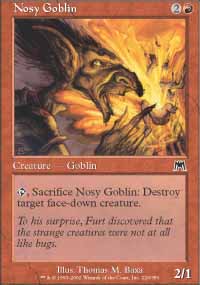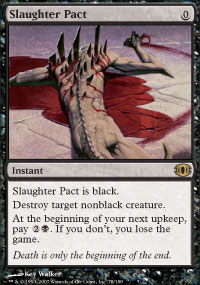
[It's been a while since we've had a good firestarter article. We know that emotions will run high reading this - please do make sure not to flame the author or anyone else if you respond to this article in our forums. All of the techniques described here have been verified by a group of judges to, in fact, be legal but not particularly sporting. That said, use them at your own risk. Other judges or organizers may have no qualms removing you from a store for engaging in not-sporting but not-unsporting behavior, especially at FNM or prereleases. -Ed]
There's been a lot of talk lately about mind tricks, especially in light of a specific play made at a Star City Games $5K tournament by Pat Chapin. These events are better documented elsewhere, but the general public opinion has been split into those who feel these practices are "dishonorable" and those who acknowledge they are existent but corner-case plays in tournament Magic. While I agree with the latter group, there are several simple plays I've put to good use over the years that fall into this grey area of tournament legality. To my knowledge as a level 1 judge and long-time competitive player, none of these are directly illegal as per DCI regulations assuming they are done correctly, but all of them fall outside of the general concept of using tight play via game mechanics to gain an advantage.
1. Take free info where possible.
The most common time this applies is pre-match. At the final Junior Super Series Championships, I actually congratulated my round ten opponent on being the first player of the event to not let me know exactly what they were playing before the first turn. To be fair, I knew what a couple people were playing from scouting and testing with them, but every other player I played in that event in some way revealed their game plan while shuffling or simply putting their deck on the table. If you watch your opponent's cards from when they remove them from the deck box to when they present them odds are you will see at least one card that gives the match up away. This can lead to a huge edge, especially in a match up that is dependent on a single card or strategy like the Faeries mirror in Standard.
The way people combat this is obviously trying to shuffle in ways that their cards aren't going to be revealed in your direction. The issue is that they usually underestimate exactly what angle their cards are facing and how little of a card face a player needs to see to know what it is. Even if the cards are shuffled flat on the table if they are bent sufficiently you will see them, and most people don't even go to that length to prevent you from getting a look at their deck. Other times they use illegal methods to conceal their deck. If your opponent tries to hide their cards under the table or shuffles with their cards facing towards them, immediately call them out on it and possibly even call a judge. Not only will doing so likely lead to them letting you sneak a look at their deck, but these are very easy ways for someone to cheat. Don't underestimate the ease of the lap grab (or any other cheat for that matter). That said, if they are using an opaque divider in their box so you can't see a card as they remove them and riffle shuffle with their cards face down on the table or overhand them far to the side there's not much you can do to get the sick peeks going. You probably want to consider using this yourself.
One other minor way to know what your opponent is playing pre-match during a PTQ season is tracking previous results from your region. If for example, you know a given player has played Naya Zoo at the last two PTQs, odds are they are playing it at that event too. This isn't perfect, but the better you know the players the more likely you will be able to predict what they are running. Obviously at a Pro level this doesn't work, but prolific local players will have known deck preferences. Use that to your advantage.
Another thing to watch is your opponent's hand in game, especially if their cards are remotely tilted. You don't have to be perched like Mike Long to see the contents of a hand already almost face up on the table. Another time people will give away free info like this is when they flip through their hand. Depending how hard they do it, sometimes they will bend their cards right at you.

No matter how sick T-Pain looks, those glasses
aren't a good idea.

Not cool dude....
2. Witty Banter
If you can't get information in a visual manner, you can get some good tidbits from chatting your opponent up. This one is a lot more dependent on your opponent's skill level. Odds are if your opponent is good, you won't get a strong read this way, but versus someone less skilled it can help maximize your edge. One of the first things I ask each match at a PTQ level event after the standard pleasantries is what my opponent has played against. If you have a good knowledge of the metagame, you can get a pretty good read on their deck. For example, if you are playing in a PTQ for Austin this summer and your opponent says they lost to Blightning, odds are they aren't playing a white deck. If they sit down complaining about how the mirror is all variance, you probably want to be able to beat a turn two Bitterblossom. If your opponent asks, the best response is to be really vague. You can try to next level them and lie, but unless your skill level is drastically underestimated by people it won't work.
In match, you can also gain some knowledge about your opponent's specific 75 and experience with the match up. During sideboarding, I like to ask how my opponent feels about the match up. Especially with a linear deck like Dredge or Affinity, this can give away exactly what scale of hate they are boarding in. This is obviously to be used on top of the standard play of watching how many cards they board, as those four cards your Goblins opponent is bringing in could be Relic of Progenitus or Leyline of the Void and knowing which one you are up against can easily make the difference between a win and a loss.
The standard pressing someone for a tell applies here, but more often then not I've found this too complex to work well. Most people, including myself, are nowhere near good enough to correctly analyze tells from people they have gleaned over the course of a long time, let alone a game or two. If you really want to do this, you are better off just watching their actions like how they tap their lands rather then trying to trick them into revealing a card or two with a tricky question.
3. Promoting Punts
There are a lot of ways to make your opponent make mistakes, starting with the pregame and mulligans. There are two routes to go here to gain value. The first is trying to put them on tilt with the fist pump or similar techniques if they mull. The second one can gain more value, but is a bit less likely to work. The goal here is to make them accidentally draw an extra card, resulting in the forced additional mulligan. Talk to them about other things as they are shuffling, and they might pick up the seventh card and have to go to five. Combining the two does not work well, as your opponent is then likely to focus on the fact they shipped their first hand.
Similarly, you distract people from remembering triggers, especially in combat by minimizing attention brought to whatever triggers them. The more complex things get, the more likely it is they will forget a trigger. Bluff a trick or move around possible blocks so that by the time damage resolves they forget about their Algae Gharial. Usually, getting them to perform an action that implies priority has been passed back and forth after a "may" trigger is grounds for them having missed it. If they do miss something optional, don't point it out then. Let them keep forgetting about it. Another thing to realize is if they finally remember it later on right after the standard cut off point, it might be in your favor to let them resolve it. If they pass post combat then realize they should have pinged you off Hissing Iguanar, if that one damage isn't possibly going to be relevant you should let them have it. Then later in the match when the same thing happens but it's three damage instead of one, they are more likely to miss it again. You can then call them on it and get the free life. This is a relatively rare case, and the free trigger can be relevant despite not looking like it, so be careful here or you might get burned by your own trick. As for your own "may" triggers, make sure it's clear what is going on. One example of this I have seen go wrong despite the player not making mistakes is with Drumhunter. By saying "end my turn," you haven't skipped the trigger, but if you try to draw when your opponent goes to untap odds are they will be able to argue to a judge you missed it, despite them only just signaling they passed priority.
Remember, this only applies to optional triggers.

You aren't Kenji, take the win
Your opponent's play is also usually easy to influence with simple suggestions. Start by suggesting extremely obvious plays early game. Later on, when things get more complicated, they might just follow along and punt. They might even second guess the obvious plays and give you a large advantage just because you could have one random trick and be baiting it. The main thing to avoid here though is giving away too many tells about what you have. If you have green up and go to mark down an attack every turn, odds are they will know you don't have a pump spell.
The time when it's right to say nothing is when your opponent is mid-win or mid-potential-loss when you are putting up a last ditch effort. Let them make their own misplays and hope for the best. At an Extended PTQ this season, I watched a Martyr player turn two games where TEPS had them completely dead into a win and a draw this way. If your opponent is mid combo, the most you should do is bluff some way to interact and hope them playing around it makes them lose. If they are going infinite, make them explain exactly what is going on, as people have a tendency to have no clue how their own deck actually works. This is true for most other shortcuts as well.
If you really want to push things to the edge, you can try to be as obnoxious as possible to put your opponent on tilt. Don't push things to the point of getting penalties for unsportsmanlike conduct, but there are little things that don't violate any rules. As mentioned above, there are all the ways to grind in a mulligan. In game, if you rip a key card that you are going to play right then, slam it down. If you are running the play suggestion thing from above, suggesting obvious blowout works well here. When they don't have the Firespout for your start of Goldmeadow Stalwart, Wizened Cenn, Knight of Meadowgrain visibly pump the fist. Same thing when they miss a key land drop, especially when they whiff when digging for it with a draw spell. Have the answer for their bomb? Feel free to add a "peace out" or something similar. Currently my favorite is to say something about how nice it is whenever I Vendilion Clique someone and choose to not take anything. There's unlimited variations here, just find the ones that fit best. Don't do anything over the top either, as there exist penalties for that. That usually means no insults, keep the noise level down, and definitely no victory laps around the table on the sick top decks, no matter how valid those are when you slam down a random/rancid Sangrite Surge for the win in a casual team draft.
The definition of acceptable also changes with venue. There's a large difference between what flies at a local FNM and a giant PTQ. Run this to the extreme at a local store, and there might be consequences outside the DCI Penalty Guide. While you can't be disqualified from the event for doing this, nothing stops a store owner from removing you from the event site. You probably also want to minimize this against people you actually care about having a reputation with. Be a giant jerk like this to a friend, and odds are they won't be your friend for long. The better way to get the edge there is by making the match play out in a more casual manner. That may put them off their A-game and lead to straight up misplays.
There are many more tricks you can run, such as noticing what counters or tokens they bring to the match (or similarly bringing extra counters or incorrect tokens to trick them), but most of these aren't as universal and simple as these. All of these also have the issue of not being extremely effective against really skilled players as they will most likely know of them, but even gaining a relatively small edge against bad players is important. Imagine a seven-round PTQ where your first five rounds are against bad players. If you go from a 80% to 85% win percentage against them by making small plays on the player on top of the game, your odds of going 5-0-2 and making Top Eight increase by around ten percent. So next time your opponent sits down with reflective glasses and starts shuffling towards you, it would behoove you to pay attention. You might mise a free win out of it.
Comments